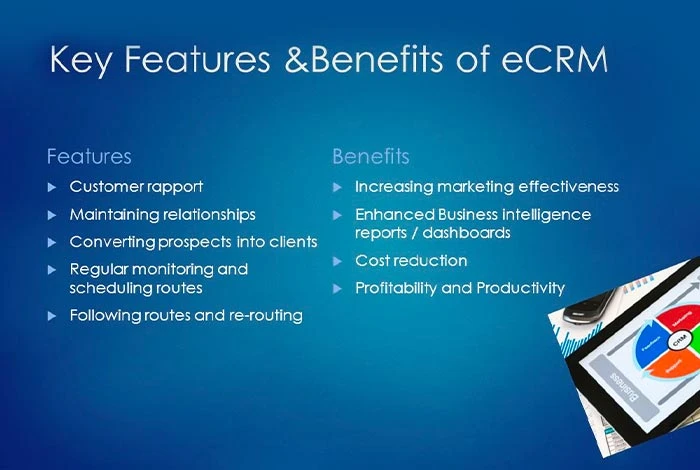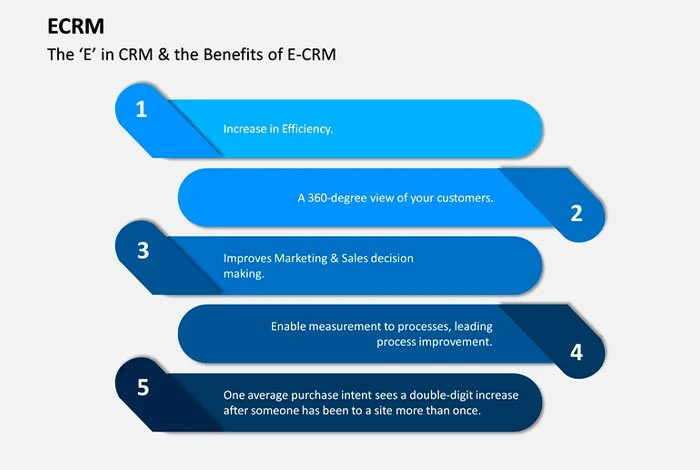Summary: eCRM tools are a great option to extract customer data from multiple channels and use this data to create sales and marketing campaigns. Let’s learn more about its usage in the article below.
Traditional CRMs are not enough to manage customer interactions at every touchpoint. These CRMs are mainly meant for tracking, storing, and managing customer data. However, with the coming of electronic CRM in business, it has become easier for businesses to manage customer interactions at every touchpoint to improve conversations and boost sales.
By leveraging technologies like social media marketing, email marketing, site cookies, etc., businesses can provide personalized customer service. The data gathered from these channels can be used to analyze customer behavior and purchase history. This information can then be used to create targeted marketing campaigns and provide a customized customer experience.
Let’s learn more about what exactly is eCRM below.
What are eCRM Solutions?
Electronic customer relationship management is a type of CRM that utilizes digital platforms like emails, websites, forums, chat rooms, social media and other channels to manage customer interactions at various touchpoints. The data generated from these touchpoints provides valuable insights into customer behavior to enhance marketing and sales strategies.
By digitizing customer data and automating procedures like communication and marketing, electronic CRM solutions help businesses save time and money and provide better customer service.
What are the Features of e-CRM?

E-CRM comes with a wide range of features that help you in improving customer interactions across several communication channels. Some of the essential features of electronic CRM are:
- Contact Management: Digitally track the contact details of customers and leads along with their purchase history, behavior, preferences, etc.
- Automate Marketing Campaigns: The software can be used to create and automate marketing campaigns across different channels and platforms. The campaigns can be created after analysing customer data.
- Sales Tracking: Provides a 360-degree view of sales coming from various channels like emails, websites, online marketplaces, social media, etc. This data can be used to identify flaws in sales strategies and devise ways to overcome these flaws.
- Case Management: Under this, customers’ complaints and queries are resolved. E-CRM tools fetch customer complaints from different channels to a centralized database that can be accessed by your customer support team to resolve queries.
- Reporting and Analysis: This feature can help in analyzing different types of data like customer behavior, sales reports, campaign performance, customer queries, etc. The analysis can further be used to enhance sales and marketing strategies.
What is the Importance of Electronic Customer Relationship Management?
The main purpose of e-CRM is to facilitate and improve customer interactions across all possible communication channels. With it, businesses can easily analyze customer data from different channels like emails and social media.
After analyzing the data, you can effectively create sales and marketing strategies to boost sales, increase conversion rate, and enhance customer experience.
Examples of eCRM
Here are some examples of how eCRM applications are leveraged to create personalized customer experience:
- Use of Emails: When a customer purchases any product from the website. The website stores the customer data like purchasing history, preferences, behavior, etc. This data is used by e-CRM to send emails to existing customers regarding the similar products, upcoming products, and discounts.
- Use of Cookies: Many online stores like Amazon uses cookies to improve the shopping experience of their customers. Amazon asks its customers to accept the cookies on the website and use them to improve the customer experience.
Next time, when the visitor visits the website, he will be greeted with a greeting or a welcome back message. Further, cookies also recommend similar products based on their purchase history. All this is managed through an E-CRM.
- Use of Loyalty Cards: Many businesses like Tesco offer loyalty cards or coupons to its customers. When the customers use them at the time of checkout, their data is fed in the electronic CRM to track purchase history. Based on this history, the company sends money saving coupons to customers to convince them to purchase more products.
Benefits of eCRM Software

Using an E-CRM can help in reducing costs, achieving maximum output, and enhancing business performance. Some other benefits of electronic customer relationship management include:
- It helps in reducing operational costs related to manual customer data management and customer segmentation.
- Assists in reaching out to multiple customers through targeted marketing campaigns
- Enables you to manage customer interactions across various channels
- Helps in building customer loyalty in the long run
- Provides real-time analytics based on customer interactions to gain valuable insights
Limitations of Electronic Customer Relationship Management
- Organizations find it difficult to customize the eCRM structure for integrating it with their existing system.
- Creating workflows in e-CRM requires technical expertise which leads to additional training costs.
- Regular updates in e-CRM due to technical advancement might be a costly affair for businesses.
How to Implement E-CRM?
You can easily implement an e crm in business by following these simple steps:
- Create objectives based on your target audience
- Choose a proper electronic CRM solution that offers advanced features based on your requirements
- Offer sufficient training to employees to easily use E-CRM
- Configure security protocols to maintain data integrity
- Integrate the software with other tools to match your business requirements
Challenges and Solution During Implementation of e CRM Applications
Businesses might face some challenges while implementing the eCRM. Here are some challenges faced by businesses and the necessary solutions that can help in overcoming these challenges.
- Data Quality Management
Challenge: Optimizing the electronic CRM needs a considerable amount of data whose collection and management is cumbersome. Not managing the data appropriately may lead to incorrect insights.
Solution: To overcome this challenge, make sure you implement proper data management procedures for storing, collecting, and sharing data. You can also take help of data intelligence tools to gather precise and complete data.
- Integration
Challenge: The major challenge faced by organizations is improper integration of eCRM with other types of software or systems. This hampers your organization’s operability especially when important data is at stake.
Solution: To properly integrate the electronic CRM with other systems like ERP, inventory management, etc., its open APIs should be considered. Also, the team must be competent enough to smoothly handle the integration process for better integration.
- Change Management
Challenge: Using a new eCRM in business requires creating new workflows and providing proper training to employees. However, employees’ resistance to using the new CRM might make it difficult for organizations to implement eCRM solutions.
Solution: For this purpose, you must provide proper training for employees from the implementation stages of the new CRM. This will help with proper execution of ECRM and better proficiency of employees in using the software.
Conclusion
In traditional CRM software, customer satisfaction can be accessed via surveys, complaints, purchase experiences, etc. However, with the coming of e-CRM, organizations can grab feedback from multiple online platforms like social media, forums, when the user interacts with the platform.
Thereby, helping organizations to easily use the feedback data to create personalized customer interactions to boost sales and build customer loyalty.
FAQs Related to Electronic CRM
What do you mean by eCRM?
Electronic customer relationship management is the use of internet-based technologies like emails, websites, social media marketing, etc., to fulfill your customer relationship building activities.
What is eCRM and its benefits?
E-CRM includes the integration of various web channels into the business CRM strategy with the purpose of driving consistency across all channels related to customer service, sales, and marketing initiatives.
What is the difference between CRM and eCRM?
The key difference between CRM and eCRM is in the communication channels they use for customer interactions. With traditional CRM, you can interact with customers through phone, distribution channels, and fax. Whereas, with electronic CRM, you can connect via the Internet, e-mail, and other latest technologies.
What are the examples of eCRM?
Some of the best e-CRM software include Salesforce, Zoho CRM, NetHunt CRM, Snovio, etc.
Varsha is an experienced content writer at Techjockey. She has been writing since 2021 and has covered several industries in her writing like fashion, technology, automobile, interior design, etc. Over the span of 1 year, she has written 100+ blogs focusing on security, finance, accounts, inventory, human resources,... Read more





























